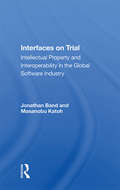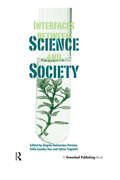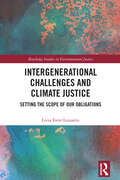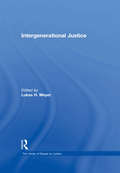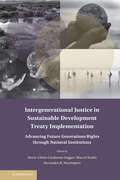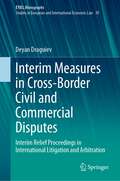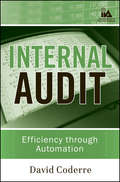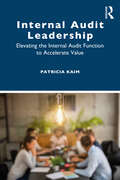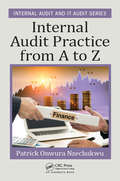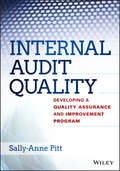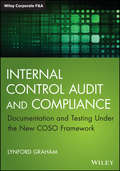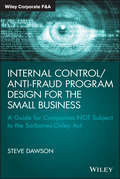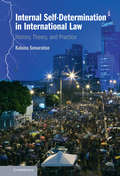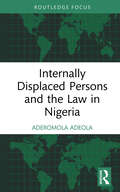- Table View
- List View
Interdisciplinary Research for Sustainable Business: Perspectives of Women Business Scholars (Strategies for Sustainability)
by Beate Sjåfjell Maja Van der Velden Roseanne RussellThis volume brings together contributions from women business scholars from a range of disciplines and countries. The starting point was a collaborative research meeting organised by Daughters of Themis: International Network of Female Business Scholars in June 2017. The volume highlights the difficulties and the possibilities that lie in working together across disciplines with the aim of achieving corporate sustainability. The volume is written from the perspective of women business scholars, thereby offering outside viewpoints in fields that still are very much dominated by men, and fresh insights and innovate ideas. In three main parts, the authors address the need for interdisciplinarity in research to identify ways to ensure the contribution of business to sustainability, showcasing a number of theoretical and applied approaches for researching sustainable business. The volume ‘s introductory chapter situates the volume in discourses of sustainability and corporate sustainability. It presents the Daughters of Themis Network and provides a short description of the successive eleven chapters. In Part I, Reflections, contributors discuss the significance of interdisciplinary research, how to work across disciplines, as well as the challenges of doing so. In Part II, Theory, contributors discuss theoretical and methodological aspects of interdisciplinary research. Part III presents the Practice of interdisciplinary research. In the introductory chapter, the editors reflect on the insights that can be drawn out of the contributions, and discuss the potential for future developments of interdisciplinary research for sustainability, as well as how interdisciplinary research can be communicated. The book is intended for business scholars, and will particularly appeal to those working in law, accountancy and finance, management, and organization studies.
Interdisciplinary Value Theory
by Steffen SteinertThis book offers an interdisciplinary introduction to value theory. It reviews how researchers in four academic disciplines – psychology, sociology, anthropology, and philosophy – understand value and value change. It offers an introduction for researchers in these disciplines about how other disciplines define, theorize, and investigate value(s) to foster interdisciplinary communication.The book identifies and summarizes similarities and differences of value theory between the academic disciplines and highlights promising areas where each discipline can learn from the others.
Interdisciplinary and Social Nature of Engineering Practices: Philosophy, Examples and Approaches (Studies in Applied Philosophy, Epistemology and Rational Ethics #61)
by Paulo Fernando Ribeiro Antonio Carlos Zambroni de Souza Maarten J. VerkerkThis book covers practical and philosophical aspects of Engineering, paying special attention to the social impacts of emerging technologies. Some fundamentals of philosophy of technology are introduced followed by social, economic, and environmental discussion and implications in different disciplines. Each chapter provides insights on the responsibilities involved in the design of engineering projects. The examples presented combine concepts about the impacts of Engineering in society at the same time that incorporates new technological models, yielding an innovative approach about the topics.
Interfaces On Trial: Intellectual Property And Interoperability In The Global Software Industry (The\information Society Ser.)
by Jonathan BandThis book presents the history of one of the key debates in the continuing effort to develop a legal framework for intellectual property rights in the burgeoning computer software industry. It is the first full account of the interoperability debate-the controversy over the protectability of interface specifications and the permissibility of
Interfaces between Science and Society
by Ângela Guimarães Pereira Sofia Guedes Vaz Sylvia TognettiThe project of science has been to provide answers to questions about the world and how it works. Often, this lofty role has been characterised by a narrow and dogmatic scientific training, an unwillingness to communicate to differing stakeholder needs, a refusal to accept and to manage uncertainty, complexity and value commitments, and the reduction of knowledge assessment to colleague peer review on narrowly technical issues. Times have changed. As the world faces increasingly disparate challenges, science is subjected to increasingly vehement demands from a society calling for transparency, openness and public participation in science policy. Science is going through an evolutionary process. Perhaps the most painful process it has ever encountered. Research on the interfaces between science and society is a burgeoning area. A new conception of knowledge now appears to be emerging, based on the awareness of complexity, uncertainty and a plurality of legitimate perspectives and interests. Democracy is extending into the previously quite exclusive scientific realm, and science must now submit to public scrutiny and participation in the governance of knowledge. This book provides much-needed reflections on the methods and tools for knowledge quality assurance, particularly on its inputs to extended policy and decision-making processes. The overall aim is to improve the relationship between science and society. The discussion involves six themes: communicating between plural perspectives; accepting and learning how to manage uncertainty, complexity and value commitments; acknowledging new conceptions of knowledge; implementing transparency, openness and participation in science policy; valuing community-based research; and exploring how new ICT can support inclusive governance. Taken together, these themes provide both a framework and vision on how to conceive, discuss and evaluate the changes that are occurring. The chapters cover theory, practice, approaches, experiences, ideas and suggestions for a move beyond "talking the talk" to "walking the walk". Science and policy interfaces are dynamic processes needing to permanently redefine themselves and their roles. This book contributes to the enrichment and deepening of our understanding of these important new trends in the social relations of science, which are fundamental to our understanding of the prospects for further progress. The book will be essential reading for scientists, policy-makers, managers and the public.
Interference: The Inside Story of Trump, Russia, and the Mueller Investigation
by Andrew Goldstein Aaron Zebley James QuarlesThe behind-the-scenes story of the investigation that shook America to its core—the Mueller investigation that presented the evidence of Russian interference in the 2016 presidential election—as told by Robert Mueller&’s closest colleagues, including never-before-revealed details into how the team investigated Putin&’s campaign to favor candidate Donald Trump and Trump&’s efforts to interfere in the investigation. Interference is the true history of the most important and consequential decisions, obstacles, and quandaries Mueller and his team faced when investigating Russian interference in the 2016 presidential election. For the first time, Mueller&’s only deputy, his most senior counselor who served on the Watergate Special Prosecution Force, and the lead prosecutor looking into obstruction of justice and Russian interference, have come together to tell a highly relevant and readable account of what it was like to carry out their investigation of election interference, as well as any connections that existed between the Russians and members of the Trump campaign. Interference also highlights the many actions Russia took as it favored candidate Donald Trump over Hillary Clinton offering a powerful reminder of how committed Russia was to determine the outcome of the election. Ultimately, the special counsel brought indictments against thirty-four individuals and entities, including Trump&’s campaign chairman; his deputy campaign chairman; a campaign advisor; his first national security advisor; and one of Trump&’s longtime associates; as well as against Russian participants. Nearly every case that was able to proceed resulted in a guilty verdict or plea. Interference explains the motivations and actions of Russia (which has not stopped exploiting America&’s weaknesses), the importance and the limitations of a special counsel, and the need for people to make principled decisions even when being pushed from all directions not to. Much can be learned from the experiences faced by the Mueller special counsel office as it broke ground on some of the most complicated challenges facing our country—then and now. The narrative carries special relevance today, as the Supreme Court has sharply limited the conduct by a president that can be prosecuted—or even investigated.
Intergenerational Challenges and Climate Justice: Setting the Scope of Our Obligations (Routledge Studies in Environmental Justice)
by Livia Ester LuzzattoClimate change poses questions of intergenerational justice, but some of its features make it difficult to determine whether we have obligations of climate justice to future generations. This book offers a novel argument, justifying the present generation’s obligations to future people. Livia Luzzatto shows that we have intergenerational obligations because many of our actions are based on presuppositions about future people. When agents engage in such intergenerational actions, they acquire an obligation to also recognize those future people as agents within their principles of justice, and with that a duty to respect their agency and autonomy. Intergenerational Challenges and Climate Justice also offers a way to circumvent the problems of non-identity and non-existence. Its approach overcomes the intergenerational challenges of climate change by meeting three necessary criteria: providing ways to cope with uncertainty, dealing with the complexity of climate change, and including future people for their own sake. The author meets these criteria by adopting an action-centered methodology that grounds our obligations of justice on the presuppositions of activity. This robust framework can be used to justify increased climate action and the greater inclusion of future-oriented policies in current decision making. This book will be of great interest to academics and students concerned with the issues of climate and intergenerational justice.
Intergenerational Justice (The Library of Essays on Justice)
by Lukas H. MeyerThe essays selected for this volume show how relations between past, current and future generations have become a major subject of philosophical research since the 1970s. The relations between people alive today with people who may exist in the future and people now deceased, differ from relations between contemporaries and in ways that raise new conceptual, logical and substantive questions. Among the questions addressed in this volume are: what is the status of people now deceased and people who may exist in the future? Can the latter be harmed by the actions of people alive today? What duties of justice do we have towards people with whom we can neither interact nor co-operate, and can people who are indirect victims of past injustices legitimately claim compensation? Answers to these questions are relevant in a number of policy areas, most notably in issues regarding reparations for historical injustice and responding to climate change and its consequences.
Intergenerational Justice in Sustainable Development Treaty Implementation: Advancing Future Generations Rights through National Institutions (Treaty Implementation for Sustainable Development)
by Alexandra R. Harrington Segger, Marie-Claire Cordonier Marcel SzabóEconomic, technological, social and environmental transformations are affecting all humanity, and decisions taken today will impact the quality of life for all future generations. This volume surveys current commitments to sustainable development, analysing innovative policies, practices and procedures to promote respect for intergenerational justice. Expert contributors provide serious scholarly and practical discussions of the theoretical, institutional, and legal considerations inherent in intergenerational justice at local, national, regional and global scales. They investigate treaty commitments related to intergenerational equity, explore linkages between regimes, and offer insights from diverse experiences of national future generations' institutions. This volume should be read by lawyers, academics, policy-makers, business and civil society leaders interested in the economy, society, the environment, sustainable development, climate change, and other law, policy and practices impacting all generations.
Interim Measures in Cross-Border Civil and Commercial Disputes: Interim Relief Proceedings in International Litigation and Arbitration (European Yearbook of International Economic Law #30)
by Deyan DraguievThe book focusses on applying a holistic overview of interim measures and associated procedures in the context of cross-border private law (civil and commercial) disputes that are the subject of international litigation and arbitration proceedings. It reexamines key features of said problem and outlines novel findings on interim relief in the area of international dispute resolution. The book analyses the rules of EU law (EU law regulations such as the Regulation Brussels Ibis and the rest of the Brussels regime) as the single system of cross-border jurisdictional rules, as well as the rules of international arbitration (both commercial and investment). In the process, it conducts a complete mapping of interim measures problems and explores the criteria for granting relief under national laws. For this purpose, it includes an extensive comparative law overview of many jurisdictions in Europe, Asia, Africa, the Americas, etc., to reveal common standards for granting interim relief. Interim relief is a salient problem in dispute resolution, and serious international disputes usually require requests for such measures. This makes a more complete understanding all the more important. For scholars and practitioners alike, there are various ways to seek relief; precisely this complexity calls for a more complex and multilayered analysis, which does not (as is usually the case) adopt the perspective of either litigation or arbitration, but instead weighs the pros and cons and considers the viability and reliability of the different options, viewed from all angles.
Intermediated Securities
by Pierre-Henri Conac Ulrich Segna Luc Thévenoz Pierre-Henri Conac Ulrich SegnaIn today's financial markets, investors no longer hold securities physically. Instead, securities such as shares or bonds are mostly held through intermediaries and transferred by way of book-entries on securities accounts. However, there are remarkable conceptual differences between the various jurisdictions with regard to the legal treatment of intermediated securities. It is widely agreed that this patchwork creates considerable legal risks, especially in cross-border situations. Two initiatives are in place to reduce these risks. In 2009, the UNIDROIT Convention on Substantive Rules for Intermediated Securities (the 'Geneva Securities Convention') was adopted, aimed at harmonisation on the international level. The EU Commission is also running a legislative project, to achieve harmonisation at the regional level. This book compares both initiatives and analyses their impact on the securities laws of selected European jurisdictions.
Internal Affairs
by Alana MatthewsWhen the call came in over the radio, Sheriff's Deputy Rafe Franco thought he would be responding to a typical domestic dispute. But he didn't know that the perp was St. Louis's most notorious mobster-or that the victim was his college sweetheart, Lisa Tobin.Now, as Rafe is drawn into a web of crime and danger, he discovers that his feelings for Lisa are stronger than ever. And her three-year-old daughter, Chloe, is melting his heart in ways he'd never imagined possible. But Lisa's ex is a powerful sociopath who will stop at nothing to get her back-or destroy her. As Rafe's instincts as a man battle with his duty as a cop, he'll do anything to ensure their survival...and their future as a family.
Internal Audit
by David CoderreInternal Audit: Efficiency Through Automation teaches state-of-the-art computer-aided audit techniques, with practical guidelines on how to get much needed data, overcome organizational roadblocks, build data analysis skills, as well as address Continuous Auditing issues. Chapter 1 CAATTs History, Chapter 2 Audit Technology, Chapter 3 Continuous Auditing, Chapter 4 CAATTs Benefits and Opportunities, Chapter 5 CAATTs for Broader Scoped Audits, Chapter 6 Data Access and Testing, Chapter 7 Developing CAATT Capabilities, Chapter 8 Challenges for Audit,
Internal Audit Leadership: Elevating the Internal Audit Function to Accelerate Value
by Patricia KaimWith an emphasis on value creation and leadership, this book will help organizations around the globe to build stronger internal audit functions, highlighting the latest risks including COVID-19 and the most cutting-edge tools to assess them. As environmental risks grow in number and complexity, and organizational resources become more constrained, the need to maximize both efficiency and effectiveness in internal auditing (IA) has never been greater. International IA expert Patricia Kaim leverages nearly 30 years’ experience to offer real-world solutions to a range of IA issues, including how to: • audit key major areas, such as organizational culture, diversity and inclusion, fraud, blockchain, and cyber risk • design first-class continuous monitoring • improve stakeholder management and add value to a range of auditing activities • increase audit speed without compromising on quality • develop high-performing IA teams with high agility, emotional intelligence, and morale Auditors, audit executives, and quality assurance professionals in business and government will gain a new understanding of how to add value to their organizations, and a toolkit of best practices in IA design, management, analytics, and more.
Internal Audit Practice from A to Z (Security, Audit and Leadership Series)
by Patrick Onwura NzechukwuInternal Audit Practice from A to Z addresses the practice of internal auditing using GAAS (Generally Accepted Auditing Standards), GAGAS (Generally Accepted Government Auditing Standards) and International Standards for the Professional Practice of Internal Auditing (Standards)-IPPF, International Standards Organization (ISO), International Standards of Supreme Audit Institutions (ISSAI), International Standards on Auditing (ISA) as enunciated by the Institute of Internal Auditors (IIA), International Organization of Standardizations (ISO), International Organization of Supreme Audit Institutions (INTOSAI), Government Accountability Office (GAO) & International Federation of Accountants (IFAC). Unique in that it is primarily written to guide internal auditors in the process and procedures necessary to carry out professionally accepted internal audit functions, the book includes everything necessary to start, complete, and evaluate an internal audit practice, simplifying the task for even non-professionals. Internal Audit Practice from A to Z features A rich array of forms, figures, tables, and reports, making it a practical, hands-on book Provides comprehensive content that contains all the practical guidance necessary to start, complete, and evaluate an internal audit practice Details on how to ensure quality on internal audit function through peer review Current international standards for the professional practice of internal auditing and other relevant standards for reference Checklists for all practice procedures as well as a checklist of the internal control of virtually all aspects of business function A blend of professional practice with theory. Internal Audit Practice from A to Z is comprehensively rich, global reference is a must for public, private, NGOs, institutions—every organization.
Internal Audit Quality
by Sally-Anne PittDeliver increased value by embedding quality into internal audit activitiesInternal Audit Quality: Developing a Quality Assurance and Improvement Program is a comprehensive and authoritative guide to better practice internal auditing. Written by a global expert in audit quality, this guide is the first to provide complete coverage of the elements that comprise an effective internal audit quality assurance and improvement program. Readers will find practical solutions for monitoring and measuring internal audit performance drawn from The IIA's International Standards for the Professional Practice of Internal Auditing, and complemented by advice and case studies from leading audit practitioners from five different continents.Major corporate and financial collapses over the past decade have challenged the value of internal audit. With an increased focus on internal audit's role in good governance, management is increasingly demanding that internal audit provides assurance of the quality of its own activities. The IIA standards provide a framework for audit quality in the form of mandatory guidance . Recent research indicates that the majority of internal audit functions do not fully comply with the standards and, as a result, are not servicing the needs of their organizations as well as they might. Internal Audit Quality offers a roadmap to internal audit quality, providing readers the guidance they need to:Embed quality into all elements of internal audit from strategic and operational planning down to day-to-day tasksCreate well-defined internal audit programs and proceduresIndependently self-assess internal audit quality and performanceConform with the IIA standards and better practiceProvide assurance over internal audit efficiency and effectivenessDeliver value by meeting stakeholder expectationsAs a key component of good governance, internal audit is on the rise. The days of retrospective, compliance-focused auditing is a thing of the past. Organizations expect more of internal audit, and many internal audit activities are accepting the challenge. Rather than relying on audit supervision and external assessments, modern auditors are embedding quality into audit activities to create effective programs. For the auditor looking to distinguish themselves as leading edge, Internal Audit Quality provides the guidance that enables the right work, at the right time, in the right way.
Internal Control Audit and Compliance: Documentation and Testing Under the New COSO Framework (Wiley Corporate F&A)
by Lynford GrahamEase the transition to the new COSO framework with practical strategy Internal Control Audit and Compliance provides complete guidance toward the latest framework established by the Committee of Sponsoring Organizations (COSO). With clear explanations and expert advice on implementation, this helpful guide shows auditors and accounting managers how to document and test internal controls over financial reporting with detailed sections covering each element of the framework. Each section highlights the latest changes and new points of emphasis, with explicit definitions of internal controls and how they should be assessed and tested. Coverage includes easing the transition from older guidelines, with step-by-step instructions for implementing the new changes. The new framework identifies seventeen new principles, each of which are explained in detail to help readers understand the new and emerging best practices for efficiency and effectiveness. The revised COSO framework includes financial and non-financial reporting, as well as both internal and external reporting objectives. It is essential for auditors and controllers to understand the new framework and how to document and test under the new guidance. This book clarifies complex codification and provides an effective strategy for a more rapid transition. Understand the new COSO internal controls framework Document and test internal controls to strengthen business processes Learn how requirements differ for public and non-public companies Incorporate improved risk management into the new framework The new framework is COSO's first complete revision since the release of the initial framework in 1992. Companies have become accustomed to the old guidelines, and the necessary procedures have become routine – making the transition to align with the new framework akin to steering an ocean liner. Internal Control Audit and Compliance helps ease that transition, with clear explanation and practical implementation guidance.
Internal Control/Anti-Fraud Program Design for the Small Business
by Steve DawsonA how-to guide to small business anti-fraud protection and internal control Internal Control/Anti-Fraud Program Design for the Small Business is a practical guide to protection for businesses NOT subject to the Sarbanes-Oxley Act. Written by an expert with three decades of forensic investigation experience, this book is geared specifically toward private, non-public small businesses and their unique needs in the realm of fraud protection. Covering all elements of an internal control structure applicable to the small business community, this guide provides a step-by-step roadmap for designing and implementing an effective, efficient internal control structure/anti-fraud program tailored to your business's particular needs. Case studies are used throughout to illustrate internal control weaknesses and the fraud that can result, and follow-up analysis describes the controls that would have reduced the probability of fraud had they been in place. You'll learn how to analyze your company's internal control issues, and implement a robust system for fraud prevention. Guidance toward Sarbanes-Oxley compliance is readily available, but there is little information available for the many businesses not subject to the act --until now. This book is the step-by-step guide for instituting an internal control program tailored to your small business. Understand the five elements of internal control Avoid gaps in protection with relevant controls Design the ultimate anti-fraud program Implement internal control tailored to your needs The majority of small business owners simply do not know the elements of or implementation process involved in internal control, and Sarbanes-Oxley guidelines don't necessarily scale down. Internal Control/Anti-Fraud Program Design for the Small Business helps you design and install the internal control/anti-fraud protection your business needs.
Internal Self-Determination in International Law: History, Theory and Practice
by Kalana SenaratneInternal self-determination is an under-explored topic in international law. It is popularly understood to be a principle of relatively recent origin, promoting democratic freedoms to populations and autonomy for minority groups within states. It has also been viewed as a principle receiving the support of Western states, in particular. In this first book-length critical study of the topic, the reader is invited to rethink the history, theory and practice of internal self-determination in a complex world. Kalana Senaratne shows that it is a principle of great, but varied, potential. Internal self-determination promises democratic freedoms and autonomy to peoples; but it also represents an idea which is not historically new, and is ultimately a principle which can be promoted for different and conflicting purposes. Written in a clear and accessible style, this book will be of interest to international lawyers, state-officials, minority groups, and students of law and politics.
Internal and External Aspects of Corporate Governance (Routledge Studies in Corporate Governance)
by Ahmed NaciriAn effective system of corporate governance has both internal and external aspects that have to be sufficiently responsive if governance is to succeed. In this book, Ahmed Naciri examines these two core aspects or the latest buzzword in business and management theory. Internal aspects include ownership structure, the board of directors and committees, internal control, risk management, transparency and financial reporting. External aspects can either be market-oriented, or can take the form of credit ranking, and/or social requirements. Due to the original orientation of the Sarbanes/Oxley Law, concentrating solely on financial disclosure and given its decisive and tremendous influence on all other similar corporate governance legislations all over the world, most writings on corporate governance have dealt with solely internal corporate governance mechanisms. This book aim is to fill up the gap by using a systemic approach and giving a global picture of the corporate governance theoretical foundations, mainly by putting the emphasis on its double dimension: internal and external.
Internally Displaced Persons and the Law in Nigeria (Routledge Studies on Law in Africa)
by Romola AdeolaThis book examines the national legal frameworks in place for internally displaced people in Nigeria and considers how they can be extended to provide further legal protection. Despite a growing global awareness of the importance of developing solutions to the problem of internal displacement, how that translates to national level response is often under-researched. This book focuses on Nigeria, where conflict and violence continue to drive high levels of displacement. The book begins by examining the definitions and causes of internal displacement in the national context, before considering the state of national law, and the applicability of the Kampala Convention for furthering protection and assistance for internally displaced persons. This book will be of interest to researchers of African studies and internal displacement, as well as to policy makers, civil society organizations, humanitarian actors and other regional and international stakeholders.
International Actors and the Formation of Laws
by Katja Karjalainen Iina Tornberg Aleksi PursiainenThis open access book addresses the discourse that creates, modifies, and reshapes the law, as well as discourse participants. The book focuses on the actors operating in legal regimes and their subtly, bluntly, or even outright aggressive impact on the formation of laws. As the book examines the intersection of domestic, European, international, and even transnational, legal regimes where new law emerges as a product of this discourse, it contributes to the understanding of the mobility of law and contemporary law’s interactive nature. This book provides enlightening examples of diverse legal fields influenced by international, non-domestic actors. It covers a wide range of relevant topics, from financial sanctions to the rights of indigenous peoples, and addresses actors ranging from the European Union and the European Court of Human Rights to disability organizations. By exploring actors, the book stresses their objectives and driving forces behind their efforts to influence law. The book reveals an array of diverging methods used by international actors to influence law. Additionally, the book resonates with Nordic legal tradition and highlights Nordic commitment to rule of law and equality. The authors are members of the Finnish branch of the International Law Association (ILA) and recognized experts in their particular fields and have been afforded freedom to adopt the approach they perceive as best suited to their topic. The book is aimed at a broad range of readers involved in academic research and study; lawyers working in government departments, international organizations, or private practice with an international focus; as well as policy makers and influencers in international organizations, government bodies, and non-governmental organizations.
International Air Carrier Liability: Safety and Security
by Rebecca Johnston David HodgkinsonInternational Air Carrier Liability brings together essential treaties and airline-to-airline agreements on air carrier liability, safety and security, and supplements these with expert commentary and analysis. The examination considers the general regulatory framework of international civil aviation (including the Chicago Convention and related documents) and how the liability regime fits within that framework. The book is divided into three parts: dealing in turn with liability, safety and security, and civil aviation regulation. Part I, for example, provides comment and analysis of the international air-carrier liability regime, how the main liability conventions operate, and the application of these conventions to international carriage by air (passengers, baggage and cargo). Given its subject matter and the universal state party participation in these conventions, this book has truly global application. David Hodgkinson and Rebecca Johnston aim to provide a reference aid for legal practitioners (at law firms, airlines, manufacturers, aviation-related corporations and government departments and agencies), as well as academics, students (undergraduate and post graduate) and government officials regarding treaties, domestic laws and documents concerned with these vital legal issues.
International Anti-Money Laundering and Soft Law: Approaches to Regulation (The Law of Financial Crime)
by Emmanuel EbikakeAdopting a mixed-methods approach, this book assesses the role of soft law as a technique to repress and prevent money laundering. The consequence of the combination of a non-traditional subject matter with the limitations of traditional international law instruments has meant that lawmakers seeking international solutions to the problems of money laundering have had to innovate. This book addresses two fundamental issues in the context of existing international and domestic responses to the problem of money laundering that have hitherto been neglected. These include the nature of the treaty obligations to criminalise money laundering, and the role of soft law as a technique to regulate it globally. The book concludes that international legal harmonisation and approximation of domestic anti-money laundering law through soft law remains helpful in addressing this pressing problem. The book will be of interest to academics, researchers, and policy-makers working in the areas of Financial Crime, Anti-Money Laundering Law, Regulation, International Soft Law, and Comparative Law.
International Approaches to Hydrocarbon Development in Disputed Zones: Unitization and Unit Operating Agreements
by Damilola S. Olawuyi Eduardo G. Pereira Marianthi PappaThis book analyses the legal obstacles associated with the advancement of unitization processes and procedures at an international level.Using case studies in international (cross-border) unitization and joint development agreements, the book uses regional examples from the Americas, Europe, Africa and the Middle East. It also touches upon case studies related to ongoing disputes from the South China Sea, Mediterranean Sea and Gulf of Guinea. Focusing on best practices which have influenced the development of the unitization concept, the book looks at the formulation of different models and agreements, and their potential impact on unexplored hydrocarbon resources, particularly in cases where unitization is necessary.The book will be of interest to practitioners, scholars and students in the field of natural resource law, international law and unitization.



